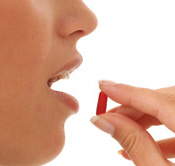Medication Use & Potential Oral Side Effects
Dentists have learned that certain medications may negatively impact oral health. One of the earliest identified oral health side effects involved use of tetracycline. The children of women who used tetracycline during pregnancy or nursing experienced a high incidence of tooth discoloration as they entered adulthood.
Some medications have been known to contribute to dry mouth syndrome (xerostomia), a relatively common medical condition that may lead to tooth decay, oral fungal infections, or speaking/swallowing difficulties. This is especially true for denture wearers. Other oral health side effects associated with certain medications include oral thrush, the shifting of teeth or tooth decay caused by excessive gum growth.
The Everyday Medicines People Use

People use medications everyday for the treatment, maintenance, or relief of a variety of conditions and ailments. Medications are used to treat conditions such as PMS, sleeplessness, an overzealous appetite, tobacco addiction, allergic reactions, unwanted facial hair and hair loss. “Maintenance medications” may be used for the management of pain, arthritis, diabetes, erectile dysfunction, water retention, depression and anxiety. Medications for illnesses such as heart conditions, high blood pressure, cancer, kidney disease, seizure, stroke or HIV may contribute to oral side effects.
It is important to let your internal medicine doctor and dentist know about the medications you are taking or plan to take. This includes, prescription medication, over the counter drugs, vitamins, and supplements. Your internal medicine doctor and dentist can help you understand any potential oral health side effects that may occur as a result of medication use. This level of preparedness may help you avoid the development of any oral health issues, including dry mouth syndrome, tooth decay or discoloration.
Oral Health Tips for Medication Takers
The good news is that the dental community has developed some tips aimed at helping you avoid medication-induced oral side effects. These oral health tips include:
- Quench your thirst. Drink at least eight glasses (64 ounces) of water each day. If your thirst does not seem to be quenched, suck on ice cubes and consider an oral moisturizer, synthetic oral saliva, or a thirst-quenching solution. Additionally, oral balance drugs are available for dry mouth.
- Investigate “special need” toothpastes and mouthwashes.
- Speak to a cosmetic dentist about solutions for tooth discoloration such as teeth whitening or dental veneers.
- Inform your dentist and primary care physician about all medications and supplements you are taking and ask if there are any precautionary measures you should consider to avoid potential side effects.
- Read the labels on your prescription drugs and gather as much information as you can about the supplements you are taking. Be aware of the noted side effects. Contact your doctor and dentist should a side effect occur.

Next, go to:


